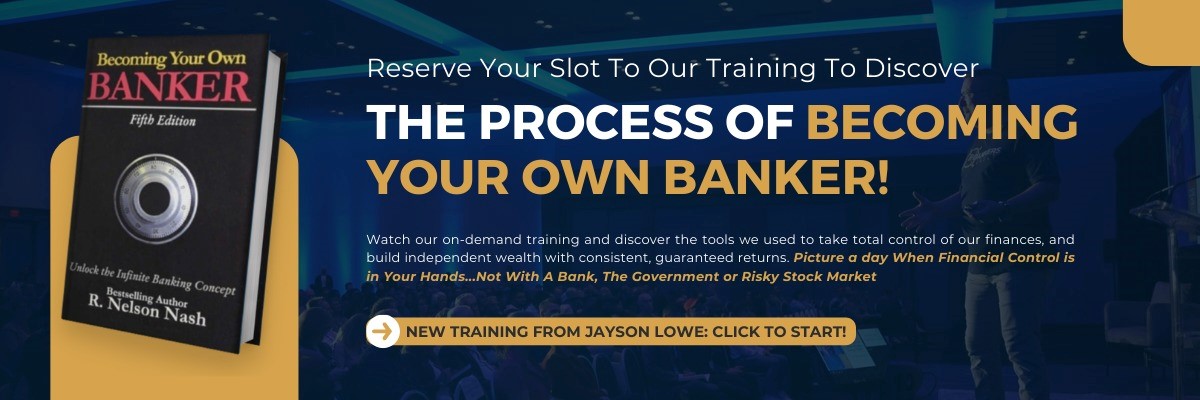Ever wondered why banks generate billions in profits while most individuals struggle to build wealth? The answer lies in how banks leverage the flow of money, earning interest on every dollar that passes through their doors. What if you could apply this same principle to your personal finances?
Infinite Banking offers a revolutionary approach to financial management, allowing you to take control of your money by becoming your own banker. This strategy leverages specially designed whole life insurance policies to create a personal financing system that grows wealth, provides liquidity, and offers tax advantages traditional banking simply cannot match.
At Ascendant Financial, we specialize in guiding clients through the implementation of the Infinite Banking Concept (IBC), helping them break free from conventional financial limitations and build lasting wealth for themselves and future generations.
This guide will introduce you to the powerful world of Infinite Banking, exploring how it works, its benefits and considerations, and how you can begin implementing this strategy in your own financial life.
What Is Infinite Banking?

Infinite Banking, also known as the Infinite Banking Concept (IBC), is a financial strategy formalized by Nelson Nash in his book “Becoming Your Own Banker.” While the name might suggest opening your own bank, the concept actually involves using dividend-paying whole life insurance policies to create a personal banking system.
The core principle is simple but profound: instead of relying on traditional banks for financing, you build and borrow from your own pool of capital. By doing so, you recapture the interest typically paid to financial institutions, redirect it to yourself, and create a growing financial asset in the process.
Key Principles of Infinite Banking
- Control: Take control of your financial life by becoming the banker, deciding when and how to access capital, set repayment terms, and allocate profits.
- Cash Flow Management: Focus on improving the efficiency of how money flows through your life, capturing and utilizing interest that would normally go to banking institutions.
- Uninterrupted Compounding: Allow your money to grow continuously, even when you access capital through policy loans.
- Stability and Predictability: Build your financial foundation on consistent growth rather than market-based investments subject to volatility.
- Generational Wealth Transfer: Create a financial legacy that can benefit multiple generations with significant tax advantages.
Infinite Banking transforms how you view and interact with money, shifting from dependency on financial institutions to becoming financially self-sufficient.

How Does Infinite Banking Work?
The Infinite Banking process follows a systematic approach that allows you to build wealth while maintaining access to capital for life’s opportunities and expenses.
Setting up a Whole Life Insurance Policy
The foundation of Infinite Banking is a properly structured whole life insurance policy from a mutual insurance company. These policies are designed to maximize cash value growth while providing a death benefit.
Unlike term insurance that only offers coverage for a specific period, whole life insurance builds cash value over time. When structured correctly for Infinite Banking, these policies emphasize early cash value accumulation through features like paid-up additions.
Working with specialists like Ascendant Financial ensures your policy is optimized for Infinite Banking rather than simply providing insurance coverage.

Building Cash Value Over Time
As you pay premiums into your whole life policy, a portion contributes to building cash value. This cash value grows in three ways:
- Base interest crediting: The insurance company provides a minimum growth rate based on your contract.
- Dividends: As a policyholder with a mutual insurance company, you may receive dividends when the company performs well. These dividends can be used to purchase paid-up additions, potentially increasing your cash value and death benefit.
- Compound Growth: Over time, your cash value experiences compounding growth, potentially accelerating wealth accumulation.
The cash value in your policy grows tax-deferred, creating an increasingly valuable asset under your control.
Using Policy Loans to Access Cash Value Without Interrupting Growth
Here’s where Infinite Banking truly differentiates itself from other financial strategies. When you need capital for any purpose, you can borrow against your policy’s cash value through policy loans.
These loans are secured by your cash value but provided by the insurance company. This critical distinction means your entire cash value can continue growing uninterrupted, even while you’ve deployed capital elsewhere through policy loans.
With non-direct recognition policies, you continue earning the same dividends and interest on your full cash value, regardless of outstanding loans. This creates a unique situation where your money potentially works in two places simultaneously.
Repaying Loans and Recycling Money for Continuous Growth
When you repay policy loans (ideally with interest), you’re essentially “paying yourself back,” recapturing the interest that would typically go to a bank. This repayment restores your borrowing capacity while potentially increasing your policy’s overall value.
This recycling of capital creates a perpetual financing system that grows more efficient and valuable over time. Unlike traditional financing where interest payments permanently leave your financial system, with Infinite Banking, these payments strengthen your financial position.
Become Your Own Banker
Discover the revolutionary Infinite Banking Concept and take control of your financial future. Learn how to recapture interest and build wealth.
Comparing Infinite Banking to Other Financial Strategies
Velocity Banking vs Infinite Banking
When exploring alternative financial strategies, many individuals encounter both Velocity Banking and Infinite Banking. While they share some similarities, they function quite differently.
Key Differences
Velocity Banking primarily focuses on using home equity lines of credit (HELOCs) to accelerate mortgage payoff and reduce interest payments. It’s essentially a debt management strategy that leverages one form of debt to eliminate another more efficiently.
In contrast, Infinite Banking creates an entirely new financial system based on cash value life insurance. Rather than focusing solely on debt elimination, it establishes a growing pool of capital that provides ongoing financing capabilities throughout your lifetime.
Unique Aspects
Velocity Banking relies on external financial institutions and requires home equity. It can accelerate debt repayment but doesn’t create a lasting banking system.
Infinite Banking builds an asset you control, provides tax advantages, and can be implemented regardless of home ownership status. It offers a comprehensive approach to wealth building rather than just debt management.
Which Approach Is Better?
The answer depends on your financial situation and goals. Many practitioners find that aspects of both strategies can be complementary, with Infinite Banking providing the long-term banking system and Velocity Banking offering techniques for efficient debt management.
Permanent Portfolio vs Infinite Banking
Another common comparison is between the Permanent Portfolio investment strategy and Infinite Banking. Both aim to provide financial stability and growth, but take fundamentally different approaches.
Key Differences
The Permanent Portfolio, popularized by Harry Browne, involves maintaining a diversified portfolio with fixed allocations to stocks, bonds, cash, and gold. This approach aims to perform reasonably well in any economic environment while minimizing volatility.
Infinite Banking focuses less on market-based investments and more on creating a financing system through dividend-paying whole life insurance. Rather than seeking maximum returns, it prioritizes control, stability, and financial efficiency.
Unique Benefits and Considerations
The Permanent Portfolio offers diversification across asset classes but remains subject to market fluctuations. It requires minimal active management but doesn’t provide readily accessible financing capabilities.
Infinite Banking offers greater control over your financial resources and provides tax-advantaged growth and access. However, it requires more active engagement and a longer-term perspective to maximize benefits.
Why Infinite Banking Offers More Control
What truly sets Infinite Banking apart is the control it provides over your financial resources. Unlike portfolio-based strategies where your capital is tied up in investments, Infinite Banking maintains liquidity and accessibility while still providing growth.
This control allows you to capitalize on opportunities, manage emergencies, and make financial decisions without dependency on external financial institutions or market conditions.
Infinite Banking Course – Register for FREE!
Sign up for our Infinite Banking Course. Recapture the interest that you pay to banks and finance companies for the major items that you need during a lifetime. Build and keep your Personal / Business wealth without Bay Street or Wall Street. Make sure to register and access the training we have put together to discover how you can Implement The Infinite Banking Concept into your life. Remember, The infinite Banking Concept is a process and it can radically improve everything that you are already doing in your current financial life.
How to get UNINTERRUPTED COMPOUNDING on the regular contributions you make to your savings, emergency fund, and retirement accounts
How to position your hard-earned money so that you will never have another sleepless night worried about how the markets are going to react to the next unfiltered Presidential TWEET or global pandemic that your family simply cannot recover from
How to pay yourself first using the core principles taught by Nelson Nash and win at the money game in your own life
How you can “RECAPTURE” debt from third party banks and lenders and move it into your own system under your control
A streamlined way to make sure you pass on your wealth the way you want on a tax-free basis
How you can move your money from forever taxed accounts and transition them into Never taxed accounts
A case study example: Hear exactly how people just like you can implement this system in their own lives and the impact of putting it into action!
That creating your own “Infinite Banking System” or “Wealth System” is possibly the most amazing method to store and protect your cash flow in the country
How implementing The Infinite Banking Process can create a generation ripple effect and teach true stewardship of money for multiple generations
How to be in the driver’s seat of your financial destiny and finally create dependable wealth that is protected and only goes one direction…UP!
Does Infinite Banking Work?
With any financial strategy, particularly one that challenges conventional wisdom, it’s natural to question its effectiveness. Does Infinite Banking actually work as promoted?
Evidence of Effectiveness
When properly implemented and managed, Infinite Banking has proven effective for thousands of individuals and families. The strategy’s effectiveness stems from mathematical fundamentals: the power of uninterrupted compounding, dividend performance of mutual insurance companies, and the efficiency of recapturing interest payments.
The strategy has been utilized for generations by wealthy families and businesses who understand its benefits for long-term wealth accumulation and preservation.
Success Stories and Examples
Many practitioners have successfully used Infinite Banking to fund real estate investments, business ventures, education expenses, and major purchases while building substantial wealth in the process.
For example, real estate investors commonly use policy loans for property down payments or renovations, repaying the loans with rental income while maintaining growth in their policies. Business owners leverage their banking systems for equipment purchases, inventory, or expansion, creating greater financial efficiency than traditional business loans.

Factors That Influence Success
The effectiveness of Infinite Banking depends on several factors:
- Proper policy design and structure
- Consistent premium payments
- Strategic policy loan usage and repayment
- Long-term commitment to the process
- Working with knowledgeable advisors who understand the concept
When these elements align, Infinite Banking provides a powerful financial strategy that can outperform many traditional approaches to wealth building.
What Are the Pros and Cons of Infinite Banking?
Like any financial strategy, Infinite Banking comes with advantages and potential considerations that should be carefully evaluated.
Advantages of Infinite Banking
- Control and Flexibility: Create a financing system you control, with access to capital on your terms without credit checks or approval processes.
- Tax Advantages: Experience tax-deferred growth of cash value, potentially tax-free access to funds through policy loans, and tax-free death benefits for beneficiaries.
- Uninterrupted Compounding: Your money continues growing even when you access capital through policy loans, creating unique financial efficiency.
- Stability: Benefit from contractual minimum growth rates and potential dividends, providing stability independent of market performance.
- Asset Protection: In many states, life insurance cash values and death benefits enjoy strong protection from creditors.
- Legacy Planning: Create a financial legacy that transfers efficiently to the next generation with significant tax advantages.
Potential Considerations
- Initial Commitment: Building an effective banking system requires consistent premium payments, particularly in the early years.
- Time Horizon: While properly structured policies provide early cash value access, the most significant benefits emerge over the long term (10+ years).
- Complexity: Implementing Infinite Banking effectively requires education and understanding of life insurance mechanics and policy loan strategies.
- Policy Expenses: Life insurance policies include costs for insurance coverage and administration that impact returns, particularly in early years.
- Discipline Required: Successful implementation requires discipline in premium payments and loan repayments to maximize benefits.
Mitigating Considerations
Working with experienced professionals like those at Ascendant Financial helps mitigate potential considerations through:
- Proper policy design to accelerate early cash value
- Educational resources to simplify complex concepts
- Personalized strategies aligned with your financial situation
- Ongoing guidance for policy management and loan strategies
With proper implementation and management, the advantages of Infinite Banking typically outweigh the considerations for those committed to the process.
How Infinite Banking Compares to Traditional Banking
To truly appreciate the benefits of Infinite Banking, it’s helpful to compare it directly with the traditional banking system most people use.
Key Differences
Traditional banking separates saving and borrowing into distinct functions, typically offering minimal interest on deposits while charging substantially higher rates on loans. Your money benefits the bank more than it benefits you.
Infinite Banking combines saving and borrowing in one integrated system where your money continues working for you even when deployed elsewhere. The interest you pay on policy loans ultimately benefits your financial system rather than a financial institution’s profits.
Accessibility Comparison
With traditional banking, loan approvals depend on credit scores, income verification, and the bank’s lending criteria. Rejections are common, and the process can be time-consuming.
With Infinite Banking, you have guaranteed access to your policy’s cash value through policy loans without credit checks or approval processes. Funds are typically available within days of request.
Interest Accumulation
In traditional banking, interest paid on loans leaves your financial system permanently, building the bank’s wealth rather than your own.
In Infinite Banking, loan interest payments potentially increase your policy’s value over time, creating greater efficiency and wealth accumulation.
Tax Advantages
Traditional bank savings accounts and CDs generate taxable interest income, reducing your effective returns.
Infinite Banking provides tax-deferred growth of cash values and potentially tax-free access to funds through policy loans, enhancing overall efficiency.
These fundamental differences explain why many financially astute individuals are shifting from traditional banking relationships to creating their own banking systems through Infinite Banking.
Explore our Becoming Your Own Banker resources for additional insights
How Whole Life Insurance Works for Infinite Banking
Understanding how whole life insurance functions is essential to grasping the power of Infinite Banking.
Cash Value Accumulation
Whole life insurance combines permanent life insurance coverage with a cash value component that grows over time. As you pay premiums, a portion builds cash value at a contractual rate, potentially enhanced by dividends in participating policies.
This cash value grows tax-deferred and can be accessed through withdrawals or policy loans. For Infinite Banking, policy loans are preferred as they allow continued uninterrupted growth of your cash value.
The Importance of Non-Direct Recognition Policies
For effective Infinite Banking, non-direct recognition policies are crucial. These policies continue paying the same dividends on your entire cash value regardless of outstanding loans.
This feature enables the unique financial efficiency of Infinite Banking, allowing your money to effectively work in two places simultaneously. When you borrow against your policy, your entire cash value continues growing as if the loan had never been taken.
In contrast, direct recognition policies reduce dividend payments on borrowed amounts, decreasing efficiency for Infinite Banking purposes.

IUL vs Whole Life for Infinite Banking
When researching Infinite Banking, you’ll likely encounter debate about whether Indexed Universal Life (IUL) or Whole Life insurance provides the better foundation.
Key Differences
Whole Life insurance offers contractual cash value growth, fixed premiums, and potential dividends when issued by mutual companies. It provides certainty and predictability with contractual values.
Indexed Universal Life features cash value growth linked to market indexes (with caps and floors), flexible premiums, and typically lower initial cash values. It offers potential for higher returns in strong market periods but with less certainty.
Why Whole Life Is Generally Preferred
For Infinite Banking, dividend-paying whole life insurance is typically recommended because:
- Contractual Values: Whole life provides contractual cash value growth independent of market performance.
- Dividends: Mutual insurance companies have paid dividends consistently for over 100 years, even through economic downturns.
- Structural Stability: Whole life offers fixed premiums and guaranteed death benefits that cannot decrease over time.
- Historical Performance: The track record of dividend-paying whole life policies demonstrates reliability and consistent growth over long periods.
While IUL may appeal with potential for higher returns, the stability and predictability of whole life typically align better with the Infinite Banking Concept’s principles of control, certainty, and long-term reliability.
Permanent vs Whole Life Insurance
When exploring insurance options for Infinite Banking, it’s important to understand the relationship between permanent and whole life insurance.
Clarifying the Terminology
Permanent life insurance is an umbrella term encompassing several types of lifelong coverage, including:
- Whole Life Insurance
- Universal Life Insurance
- Indexed Universal Life Insurance
- Variable Life Insurance
Whole life is a specific type of permanent insurance that offers contractual premiums, cash value growth, and death benefits.
Why Whole Life Is Preferred for Infinite Banking
Among permanent insurance options, participating (dividend-paying) whole life insurance is generally preferred for Infinite Banking because it provides:
- Contractual Values: Contractually defined cash value growth and death benefits.
- Dividend Potential: Opportunity for enhanced growth through dividends from mutual insurance companies.
- Structural Consistency: Fixed premiums that cannot increase, unlike universal life policies where costs may rise over time.
- Simplicity: Straightforward structure without the complexity of universal life’s various moving parts.
These characteristics align with the predictability, stability, and growth needed for an effective Infinite Banking system.
Take Control of Your Money
Ready to explore a powerful alternative to traditional banking? Learn how the Infinite Banking Concept works and if it’s right for you.
How to Start Infinite Banking
If you’re convinced that Infinite Banking could enhance your financial future, how do you begin implementing this strategy?
Choosing the Right Whole Life Policy
The foundation of your Infinite Banking system is selecting the appropriate whole life insurance policy. Look for:
- A mutual insurance company that pays dividends to policyholders
- Non-direct recognition policy features
- Options for paid-up additions to accelerate cash value growth
- Flexibility in premium payments and policy design
Working with advisors experienced in Infinite Banking is crucial, as standard whole life policies are typically not structured optimally for this strategy.
Working with Experts for Policy Design

Ascendant Financial specializes in designing policies specifically optimized for Infinite Banking. Our approach includes:
- Assessing your financial situation and goals
- Custom-designing policies to maximize early cash value
- Structuring premiums and paid-up additions for optimal growth
- Ensuring policies remain compliant with tax guidelines in the US and Canada
This personalized design ensures your banking system aligns with your specific financial objectives and circumstances.
Book a call with one of our financial strategists to discuss your unique circumstances and goals
Developing a Strategy for Building Cash Value and Using Policy Loans
Beyond initial setup, developing a comprehensive strategy for:
- Consistent premium payments to build your banking system
- Strategic use of policy loans for investments or major expenses
- Disciplined loan repayment to maximize system efficiency
- Ongoing optimization as your financial situation evolves
This strategic approach transforms Infinite Banking from a concept into a practical financial system that serves you throughout your lifetime.
Best Whole Life Insurance for Infinite Banking
Not all whole life insurance policies are created equal when it comes to implementing Infinite Banking effectively.
Key Characteristics to Look For
When selecting a policy for Infinite Banking, prioritize these features:
- Mutual Company Structure: Companies owned by policyholders rather than shareholders typically offer better long-term value through dividends.
- Dividend Performance: Look for companies with strong, consistent historical dividend payments, as these enhance cash value growth over time.
- Non-Direct Recognition: Policies that continue paying the same dividends regardless of outstanding loans maximize the efficiency of your banking system.
- Early Cash Value Access: Policies designed to accelerate early cash value accumulation provide greater utility in the initial years.
- Paid-Up Additions: The ability to make additional payments to purchase paid-up insurance accelerates cash value growth.
Companies Known for Infinite Banking Policies
Several insurance companies are known for offering policies well-suited for Infinite Banking, including:
- Penn Mutual
- MassMutual
- Guardian
- New York Life
- Northwestern Mutual
The “best” company varies based on individual circumstances, including age, health, financial goals, and premium capacity.
How to Structure a Whole Life Policy for Infinite Banking
The specific structure of your whole life policy significantly impacts its effectiveness as a banking system.
Optimizing Policy Design
Effective structuring typically involves:
- Minimizing the base policy (which has higher insurance costs)
- Maximizing paid-up additions (which build cash value faster)
- Balancing premium allocations to remain compliant with tax guidelines
- Including appropriate riders for flexibility and additional benefits
This optimization accelerates cash value growth while maintaining the policy’s status as life insurance rather than a modified endowment contract (MEC).
Using Infinite Banking for Real Estate and Debt Repayment
Infinite Banking provides particularly powerful applications for real estate investing and debt repayment strategies.
Real Estate Applications
Many practitioners leverage their banking systems for:
- Down payments on investment properties
- Full property purchases without traditional financing
- Renovations to increase property values
- Bridge financing for real estate opportunities
The flexibility and speed of policy loans make them ideal for real estate investors who need quick access to capital without lengthy approval processes.
Debt Repayment Strategies
Infinite Banking can also transform your approach to debt by:
- Consolidating high-interest debt with policy loans
- Creating systematic repayment plans that benefit your banking system
- Breaking the cycle of interest payments to financial institutions
- Building a growing asset while eliminating liabilities
These strategies redirect interest payments from financial institutions to your own banking system, potentially saving thousands of dollars over time.

Frequently Asked Questions
What Are the Challenges with Infinite Banking?
While Infinite Banking offers significant benefits, several challenges should be considered:
- Initial Commitment: Building an effective banking system requires consistent premium payments, particularly in the early years. This requires financial discipline and cash flow management.
- Education Required: Understanding and implementing the concept effectively demands education and ongoing learning. Some individuals find the learning curve challenging.
- Policy Expenses: Life insurance policies include costs for insurance coverage, commissions, and administration. While these expenses decrease in relevance over time as your cash value grows, they impact early returns.
- Long-Term Perspective: Though properly structured policies provide early cash value access, the strategy’s most significant benefits emerge over decades rather than years.
- Discipline in Implementation: Success requires discipline in premium payments, strategic policy loan usage, and consistent loan repayment. Without this discipline, the strategy’s effectiveness diminishes.
- Finding Qualified Advisors: Many financial professionals don’t fully understand Infinite Banking or how to properly structure policies for maximum effectiveness.
With proper education and guidance from experienced professionals like those at Ascendant Financial, these challenges can be effectively managed, allowing you to maximize the benefits of your Infinite Banking system.
How Much Money Do I Need to Start Infinite Banking?
Getting started with Infinite Banking is more accessible than many people realize, though optimal results depend on consistent funding.
Minimal Starting Points
While there’s no absolute minimum, most practitioners find that effective implementation typically begins with:
- Monthly premiums: $300-500 monthly for individuals just starting their financial journey.
- Annual premiums: $3,600-$6,000 annually for those beginning with modest contributions.
These amounts allow for policy establishment with some early cash value accumulation, though access to significant capital would build gradually.
Optimal Funding Levels
For more substantial results and quicker access to meaningful capital:
- Many advisors recommend directing 15-20% of income toward premiums when possible.
- Annual premiums of $10,000-$50,000+ create more substantial banking systems with greater early accessibility.
The key consideration is consistency in funding rather than initial amount. Many practitioners start with what’s comfortable and increase contributions as their financial situation improves.
Scalability of the Strategy
An important advantage of Infinite Banking is its scalability. You can:
- Start with a smaller policy and add additional policies over time
- Increase premium payments as your income grows
- Utilize paid-up additions to accelerate cash value growth when extra funds are available
This flexibility allows individuals at various financial stages to implement the strategy successfully.
Conclusion & Next Steps
Infinite Banking offers a powerful alternative to traditional financial strategies, providing control, flexibility, and efficiency that conventional approaches simply cannot match. By becoming your own banker, you position yourself to build wealth while maintaining access to capital for life’s opportunities and challenges.
The strategy’s core benefits include:
- Control over your financial resources
- Uninterrupted compound growth
- Tax advantages for accumulation and access
- Protection from market volatility
- Legacy creation for future generations
While implementing Infinite Banking requires education, commitment, and discipline, the potential long-term rewards make it worthy of serious consideration for those seeking financial independence.
Explore Additional Resources
- To deepen your understanding of Infinite Banking and how it might benefit your specific financial situation, we encourage you toegister for our upcoming Infinite Banking Concept webinar to learn directly from our experts
Remember, financial freedom isn’t just about accumulating assets; it’s about creating systems that give you control and efficiency throughout your financial journey. Infinite Banking, when properly implemented, can be the cornerstone of such a system.
Book a Call with an Advisor at Ascendant Financial
Contact Ascendant Financial today to review all of your financial options.

Popular Posts
- How to Build Generational Wealth for Your Family
 What if the legacy you leave behind isn’t just wealth, but the wisdom and structure to grow it for generations to come? At Ascendant Financial,… Read more: How to Build Generational Wealth for Your Family
What if the legacy you leave behind isn’t just wealth, but the wisdom and structure to grow it for generations to come? At Ascendant Financial,… Read more: How to Build Generational Wealth for Your Family - How to Choose the Best Whole Life Insurance Policy for Infinite Banking
 Many people researching the Infinite Banking Concept™ believe the best whole life policy comes down to choosing the right insurance company. But the truth is,… Read more: How to Choose the Best Whole Life Insurance Policy for Infinite Banking
Many people researching the Infinite Banking Concept™ believe the best whole life policy comes down to choosing the right insurance company. But the truth is,… Read more: How to Choose the Best Whole Life Insurance Policy for Infinite Banking
Share This Post
About the Author:
Jayson Lowe
As a seasoned coach, author, and podcast host, Jayson’s insights are rooted in real-world experience and a proven track record of turning challenges into opportunities. He’s not just a speaker—he’s a catalyst for change, inspiring audiences with actionable strategies and the motivation to implement them. Whether you’re looking to ignite your team’s potential, elevate your business strategies, or gain unparalleled insights into entrepreneurship, Jayson Lowe delivers with passion, clarity, and an undeniable impact.
Categories & Tags






